This year’s Sustain, EcoVadis’ annual event and one of the world’s top conferences on sustainable global supply chains, saw more grandeur than ever before. More than 600 professionals from the procurement and CSR worlds descended upon Paris on March 11-12, ready to share best practices, exchange ideas and ignite change in global supply chains and beyond.

Ignite Change
An inspiring global-message video featuring children, adults and teenagers from all over the world kick-started the conference and set the tone for the entire event. Governments and businesses across the globe are increasingly committing to international initiatives and sustainable practices but “there is still so much more change we need to see,” as stated one of the individuals in the video: Change in the way we do business, change in the way we travel, change in our everyday lives. We must immediately tackle the climate, human rights and ethical challenges we face, and the global business community is in a unique position to drive change.
This is what the event sought to address in all the sessions and presentations: How do we ignite change and move toward a sustainable future? And the answer, regardless of the sector, is through perseverance, innovation and exponential thinking.
Did you miss it? Do you represent a business? Your voice counts!
Whether you are a buyer or a supplier, you too can help ignite change by completing the survey for our 2019 Sustainable Procurement Barometer, conducted in partnership with The NYU Stern Center for Sustainable Business:
Procurement Practitioners’ Survey
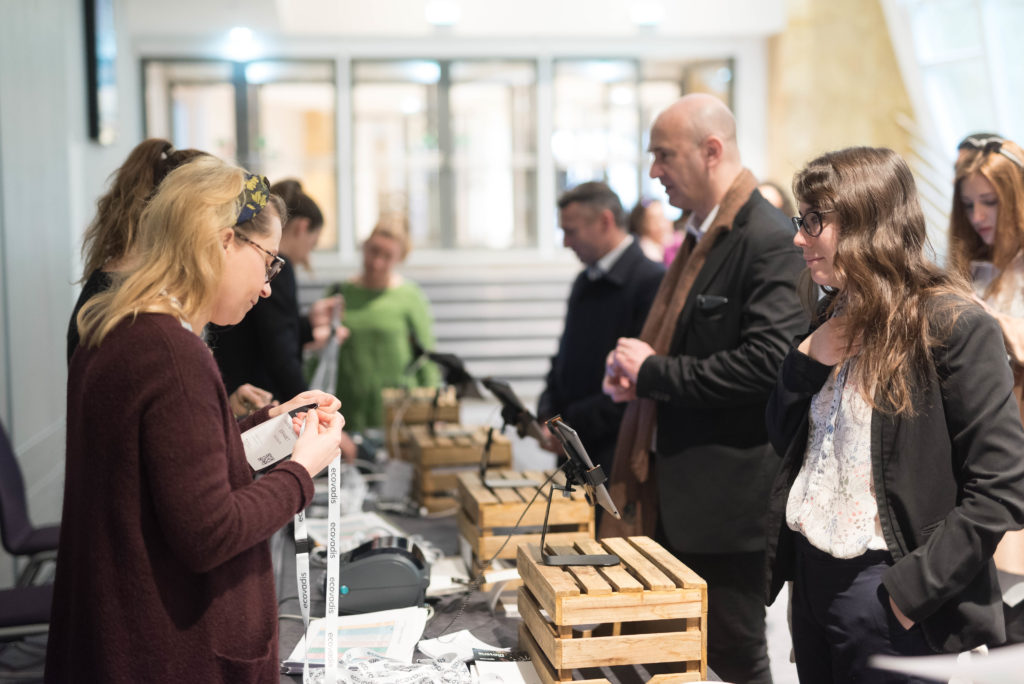

Perseverance
Perhaps the most striking examples of perseverance were the ones shared by the inspiring keynote speakers. Jean-Louis Etienne, a French doctor, explorer and scientist, particularly well known for his Arctic and Antarctic explorations gave a fascinating account of how important perseverance is in both organizing expeditions and undertaking them. And it is also his untiring perseverance that is driving him, at the age of 73, to embark on the most ambitious Arctic exploration of his life aboard the Polar Pod, a revolutionary vertical ship drifting around the South Pole.
Likewise, it was a huge amount of dedication, hard work and perseverance that made it possible for Shraysi Tandon, a journalist and documentary filmmaker – and another keynote speaker – to put together her latest film “Invisible Hands” uncovering instances of child labor in the supply chains of the world’s largest companies. And it was the incredible perseverance of Kailash Satyarthi, as Ms. Tandon explained, that compelled her to start this project in the first place. Mr. Satyarthi, an Indian children’s rights activist has saved more than 80,000 children from child labor, slavery and trafficking before he received a Nobel prize in 2014.
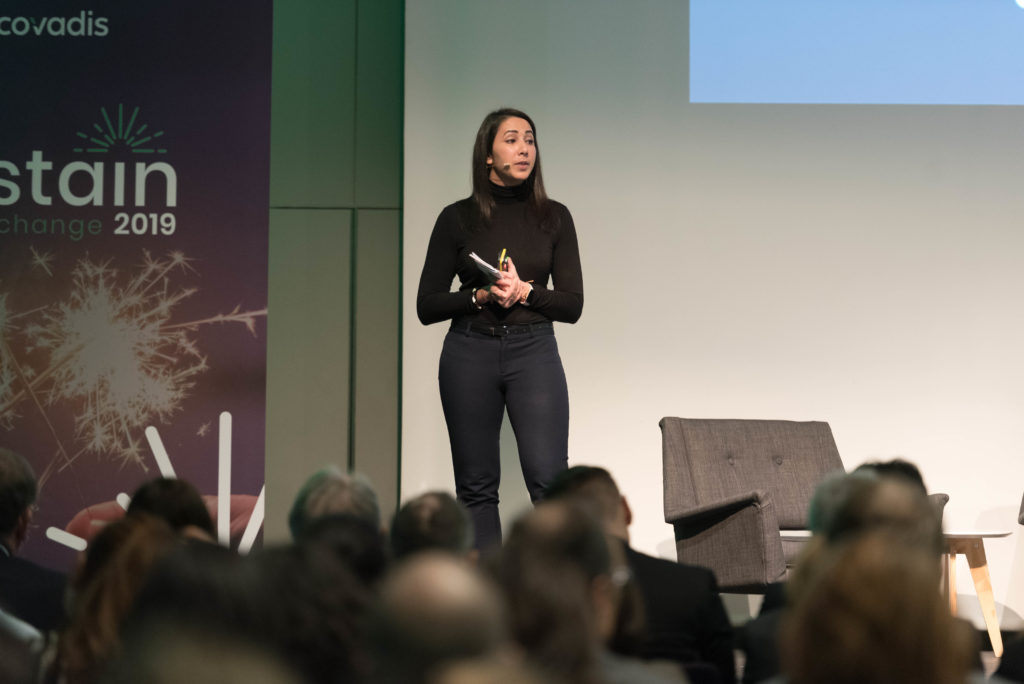
Taking a wider look at sustainability, Tim Mohin, author and GRI Chief Executive, speaking in one of the panels showcased GRI’s great perseverance in setting the only independent global standard for sustainability reporting, representing the global consensus on the best practice. With the first CSR report published in 1995 and sustainability reports initially perceived as an “irritant” to financial results, changing to a “nice to have” about a decade ago, we now see 93 percent of companies reporting on sustainability.
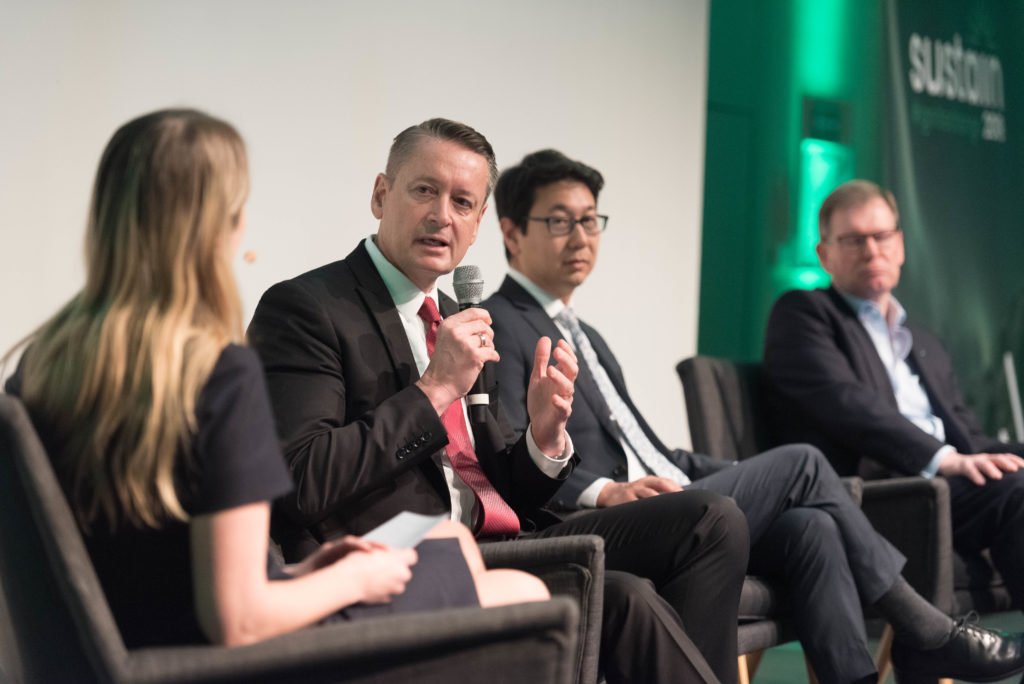
Innovation
Interestingly, though unsurprisingly, perseverance goes hand in hand with a growth mindset and innovation. These are crucial aspects of the world’s journey toward sustainable supply chains and the quest to embrace circular economy.
“Stop talking about waste but rather about resources – CO2 can become a feedstock,” said Patrick Thomas, Chairman, Johnson Matthey plc & Founder, World Plastic Council. Given the fast pace of changes taking place in the world at the moment and the grave challenges we are facing, we only have one or two years to make real change. We need to start thinking about waste as being “valuable,” we need to be productive with our use of carbon and must understand that landfills can in the future be mined for resources. CO2 is already used as raw material, explained Mr. Thomas quoting a line of mattresses as a great example of products made from CO2 foam.
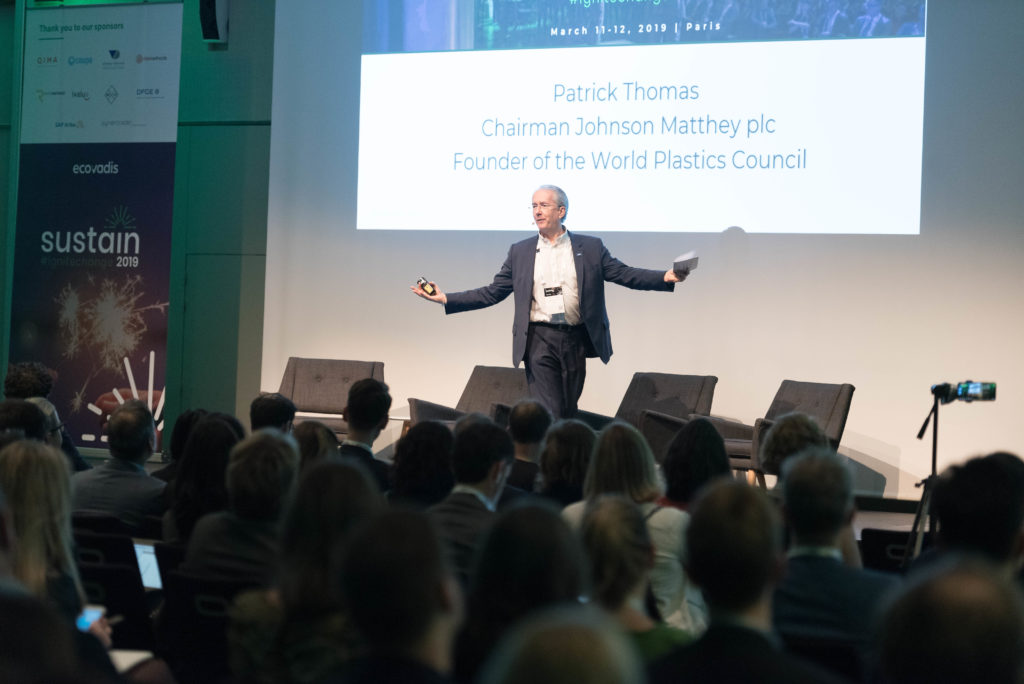
But implementing effective reuse – which is the ultimate answer – will be truly achievable if we start with innovative eco-design, in other words, if we design to reuse. What is interesting, however, is that circularity can be used to drive loyalty and bottom-line results: “Seize the opportunity to use circularity to drive brand loyalty and bottom-line results,” said Mr. Thomas.
When it comes to innovation and designing a better product, procurement is both in an age of innovation and at the heart of innovation leadership. As Helene Paul, Chief Procurement Officer at Michelin, put it: “From the very moment we started talking about sustainability, in the early 2000s we got to the point where the governance is designed in a way to collaborate within the company. Through this we’re working to accelerate innovation and working towards supporting sustainability.”
During one of the breakout sessions, entitled “From Supply Chain Innovation to a Better Product,” experts agreed that to effectively drive innovation and encourage sustainable product design procurement organizations must incorporate the following three tactics:
- Change in mindset into looking at suppliers as partners instead of vendors;
- Clear communication and collaboration and potentially an incentive program;
- A dedicated cross-functional innovation program that sits outside of procurement.
Exponential Thinking, Risks and Solutions
But talk of innovation would be meaningless without looking at the backdrop of change, progress and turmoil taking place in the world. And when referring to those, Sustain speakers tended to use the term exponential: Exponential growth, exponential risk and exponential solutions.
Jean-Yves Poichotte, Chief Information Security Officer at Sanofi, observed that data privacy risks are becoming exponential and it was not rare these days for companies to deal with more than one attack a day. “(…) today we are identifying a new kind of cyber threat, namely the supply chain attack. Instead of trying to bypass our protections, attackers (…) try to identify one, or more of our partners, a weak one, and succeed this way.”
Cyber security is a key element of responsible practices, particularly with the EU’s General Data Protection Regulation (GDPR) in place. It is vital that we strike a balance between business value and business risk, and in today’s digitalized world everyone will soon have to become a cyber security expert, noted Poichotte.
However, we can also talk about exponential solutions with sustainable finance being a major one. Money managers and institutions are increasingly applying sustainability criteria to address issues related to climate change, diversity, human rights, weapons and political spending. As a result sustainable, responsible and impact investing (SRI) assets have expanded to $12.0 trillion in the United States, up 38 percent from $8.7 trillion in 2016. And it is crucial that we use education and training in the right way as they can form an exponential lever in driving sustainable solutions, as noted by both Bill Cooper, Associate VP and Director of Procurement at the University of California at Berkeley, and Malcolm Harrison, CEO of the Chartered Institute of Procurement & Supply (CIPS).
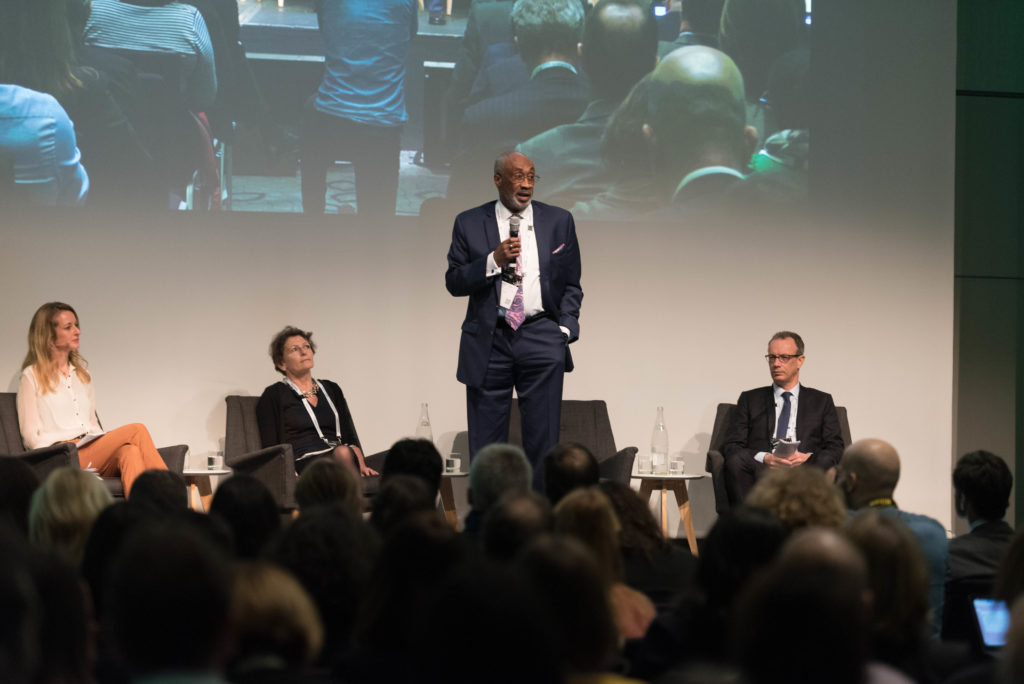
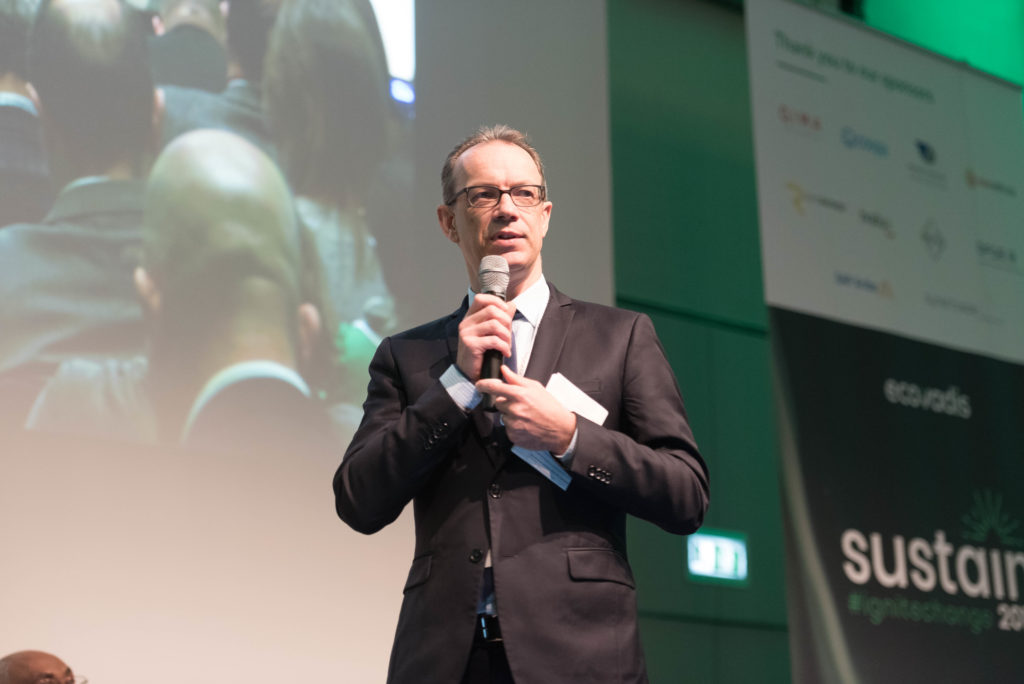
Sustainable finance and supply chain are areas we are starting to support at EcoVadis. We signed a partnership with ING last year to support the its lending business in giving preferential rates to businesses that have a strong sustainability management system. And more recently we have partnered with another major bank on a similar rate preference program for supply chain financing. Looking at other growth dimensions, we are also proud to contribute to this and provide exponential solutions, helping to assess risks at deeper tiers in the supply chain.
Sustainability Excellence
It is with great joy that we are contributing to this perseverance, innovation and exponential progress to promote better sustainability performance as the world’s most trusted provider of business sustainability ratings, intelligence and collaborative performance improvement tools for global supply chains. This why it was with great pleasure that during this year’s event we awarded for the third year running sustainable procurement leaders – buyers and suppliers, companies and individuals – for their achievements in driving sustainability.
To all our presenters, speakers and attendees – a sincere thanks for your contribution and involvement. The event would not have been the same without you.
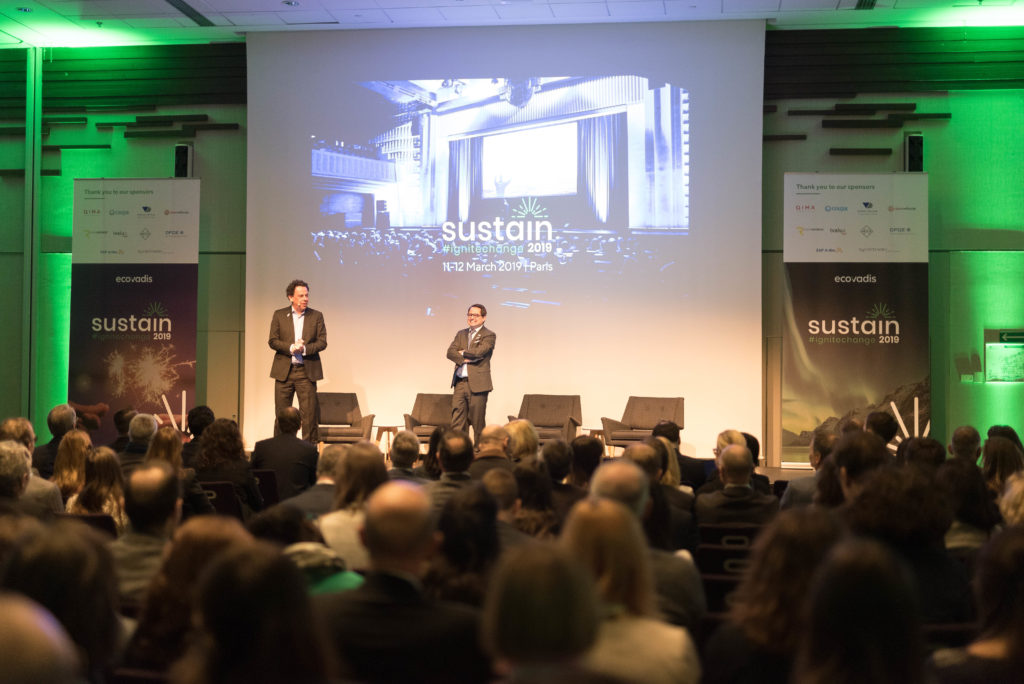
Why not contact us straight away if you are interested in speaking during our 2020 event?























